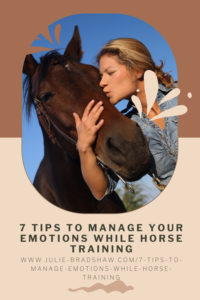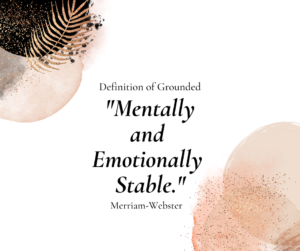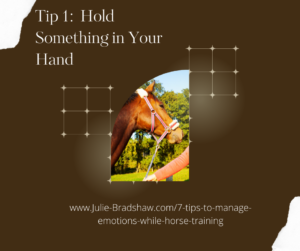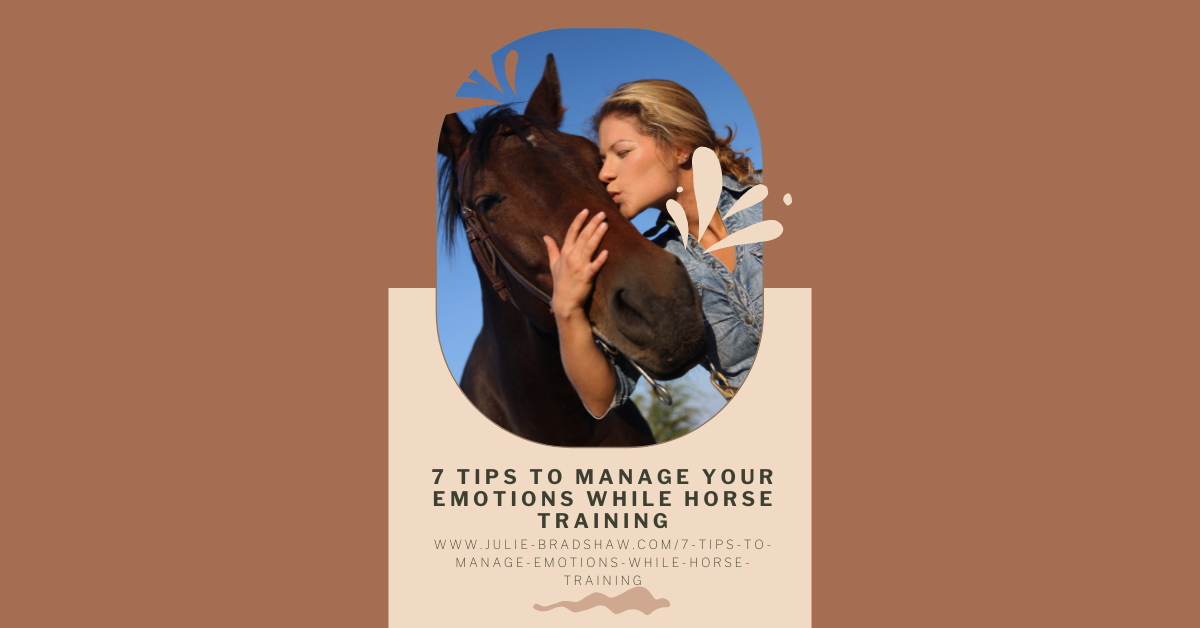Working with horses will try the most patient of people. To manage your emotions while horse training can be easy though, if you're equipped with the right tools. Your emotions, while training your horse, can include joy and happiness, but they can also include self-doubt, anger, frustration, and even grief. As much as we love our horses, they can trigger a lot of challenging emotions within us.

Overwhelmed While Training Your Horses?
It can be very easy to feel overwhelmed when working with a 1,000+ pound animal that may be overwhelmed itself, or isn't understanding what you are trying to communicate. Once you feel overwhelmed, it’s not always easy to move yourself to a better mental space without the tools to do so.
However, learning to deal with overstimulation, high emotions, and potentially, anxiety, is a skill that you can learn and develop. And it will help your horse in ways you might not expect.
With enough practice, you can quickly get yourself back on track from any negative emotional state, and get back to training your horse with patience and compassion.
And of course, this can translate to any part of your life, not just horse training. You can manage your emotions while horse training AND when faced with other challenging life events as well.
From Overwhelmed to Grounded

The opposite of overwhelmed is grounded. What does grounded even mean? Is it just some sort of “woo-woo” word that involves auras, chakras and yoga poses?
Merriam-Webster defines grounded as “mentally and emotionally stable.” Stable…how appropriate when we're talking about horses, right? I love a good pun.
There is no better state to be in while working with horses than grounded. So, let's go over some tips for grounding. I may even throw a woo-woo influenced tip or two in here, because in truth, they work!
7 Tips for Grounding if Your Emotions Get High While Training Your Horse
Here are some great ideas for managing your emotions while training your horses! Follow these strategies:
Tip 1: Whether it's a lead rope already in your hand, or another item, hold something in your hand.
Find an object nearby and pick it up if you need to. The more interesting the object, the better it will work for this exercise. Nearly anything will work: A halter, a hoof pick, headlamp, rock, or even a boot are all fine.
Hold the object in your hand and focus on the texture. Avoid looking at the object. Just feel it, or move it around in your hand. How does it feel? Smooth, rough, cold, warm, light, heavy?
Move it around and imagine the shape of the object as you’re feeling it. Try to form a mental picture based on what you’re feeling.
Describe the texture and shape to yourself. It's fascinating to me that saying things out loud will shift a perspective or emotion, but it will.

Tip 2: Continuing with the sense of touch, put your hand on the ground.
Or if you're like me, and your pasture has trees, walk to a tree and put your hand on it.
Because our bodies have an electrical charge, touching the ground, or something rooted deeply in the ground, really is grounding for us. It's probably why so many people love gardening, it keeps them calm and grounded. I mean, have you ever seen an angry gardener? LOL.
Tip 3: 5-4-3-2-1.
This is another technique that will invite you to focus on your senses. But this time you’re going to use all of them.
● Look around you and describe something you see. Maybe it's a fence, a stall, a tree, an arena, or a jump or other obstacle. You can do this aloud if you like, or if other people are around and you don't want people to think you are talking to ghosts, you can do it silently.
Describe the physical appearance of the item/object in detail for 10-15 seconds. It may include color, texture, shape, or even smell. Repeat this until you have described five items in your surroundings.
● Now, describe four things you feel. In this case, it could be an object like in the first tip. It can also be a physical sensation, such as the chair beneath you, the temperature of the air on your skin, or your itchy nose.
● Next, describe three things you can hear. That is never a problem when you have or are around horses, as there always seem to be other animals moving around, a barn door flapping, a cat meowing, or a horse scratching on a fence post.
● What are two things you can smell? Pick something up and smell it if necessary. However, when you're around horses, there is a plethora of smells to be had. If it's safe to do so, lean over and smell your horse. Smell the lead rope. I don't recommend smelling the bottom of your boots however. Or if you're out in a pasture, maybe there is a flower to smell.
● What does your mouth feel/taste like right now? Is your mouth dry? Did you just take a drink? Have a drink if necessary. You probably have a bottle of water, a soda, a cup of coffee or something else to drink nearby. Maybe have one of those peppermints you keep around for your horse. How does it feel and taste in your mouth?
Tip 4: Phone a friend.
One of the best ways to deal with feeling overwhelmed is to reach out to a friend and have a talk. If it's a fellow horse owning friend, they may be able to give you insight you hadn't thought of. Or just remind you that what you are feeling is perfectly normal.
Hint: You don’t want to call that friend that always seems to complain or make everything about them. Call an upbeat friend that knows how to make you feel better.

Tip 5: Close your eyes (assuming it is safe to do so with your horse) and apply all those senses to yourself.
How does your body feel? Are you shaking? Where is the tightness or tension in your body?
What does the air feel like immediately around your body? Can you smell your soap? Are your hands bunched in a fist? Shoulders up towards your ears?
Wherever you see, feel or sense tension, loosen it up. See or feel that tension flowing away from where it is.
Tip 6: Focus on your breath.
Breathing 6-10 breaths per minute has scientific support for health, and calming the parasympathetic nervous system. This is the symptom that gets activated when you become highly emotional.
Just remember, “slow” and “in through the nose and out through the mouth.” These are the key factors in breath work.
Feel the air go in through your nose, and out through your mouth. If you love dolphins, you might add holding your breath just like a dolphin does when diving after it takes a big deep breath.
Big, but slow, inhale through your nose, hold the breath, out through your mouth until all the air is gone.
Do that at least 6 times. You can only think about one thing at a time. If your attention is on your breath, it can’t be on whatever is making you feel overwhelmed.

Tip 7: Distract yourself.
- If all else fails, distract yourself in some way.
- Play a quick game on your phone.
- Read a few articles on my blog, or pages from a book.
- Watch a video of a cute kitten. Laughter truly can turn your emotions around.
- Turn up some music and dance around the stall or paddock.
- Do something to redirect your thoughts until you are grounded.
To Manage Emotions While Horse Training Takes Practice
You may have to pick and choose from these. There may be one that works better than another. Or in some situations, but not others. The important thing is to find what works for YOU, and do it.
Let me know if you try any of these and how they work for you. See, I only had you touching trees, not doing yoga poses.


I have struggled with anxiety all my life… I have used some of these tools/ methods to help gain a healthy perspective during tough times. Makes so much sense to use all of them while training!
Thank you for sharing that with me Nancy! I too struggle with anxiety. Thus many of these tips and others I know from experience work. They can be used in the pasture, paddock and arena as well with great success!